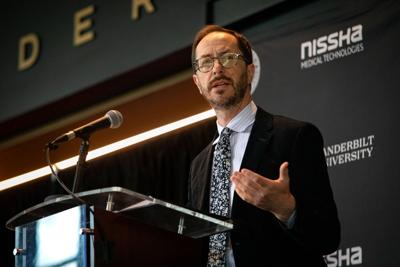It’s been two years since Mayor Freddie O’Connell was sworn into office, signifying the halfway point in a four-year term marked thus far by a voter-approved transit referendum, development of the East Bank and ongoing battles with the state.
O’Connell, a former District 19 Metro councilmember representing areas of downtown, Salemtown and Germantown, defeated conservative strategist Alice Rolli by about 29 percentage points in the 2023 mayoral race. During his campaign, he received support from labor unions, progressive advocacy groups, education associations and a host of current and former councilmembers.
Recently, two of O’Connell’s top advisers resigned. Marjorie Pomeroy-Wallace, a former chief of staff and chief strategy officer to the mayor, stepped down last month. On Sept. 24, O’Connell’s chief development officer Bob Mendes announced he is also set to leave his position at the end of October.
As O'Connell gears up to enter the second half of his term, here are a few issues that have defined the mayor’s first two years leading Nashville.
Transit Referendum
Nashville voters last November overwhelmingly approved the O'Connell-led “Choose How You Move” transit referendum, with the program aiming to improve the WeGo bus system, sidewalks, traffic lights and other transit-related items. The initiative comes as a $3.1 billion spending plan to be implemented over the next 15 years and is funded through a half-cent increase to the local sales tax.
Mayor eyes $60 million in roadway, planning and technology spending
Efforts have started to roll out since the referendum’s passage with WeGo upgrades and other transit projects announced earlier this year. In April, O’Connell named a former U.S. Department of Transportation official as chief program officer of the transit plan and appointed nine community members to the Choose How You Move Advisory Committee on Transportation.
The referendum has faced legal battles that have mostly resulted in the upholding of the program's legality. One appellate court decision ruled that funding for the program can’t be used for housing development or parks, which were originally to have accounted for about only 1 percent of the plan.
East Bank Development
When O’Connell entered his role at the mayor’s office, he also had to take on responsibility of more than $700 million in the $2.1 billion deal for the future Titans Stadium, something signed off by his predecessor, then-Mayor John Cooper.
Overall construction is approximately halfway done, with completion still set for February 2027
As a councilmember, O’Connell opposed the idea of Metro funding part of the stadium’s construction. He has now shifted his focus to the stadium's anchoring location within the 550-acre East Bank site, with the project in the works by Metro, master developer The Fallon Company and others. The site is set to include a 300-plus unit affordable housing development, additional multifamily housing and a full-service hotel.
The East Bank has continuously been touted as a major economic development project for the city, and O’Connell is tasked with leading much of the effort. The mayor appointed Ben York as chief executive officer of the East Bank Development Authority in March. Anna Grider was tapped as chief operating officer, and several board members for the authority have also been named.
Areas of uncertainty have risen for certain East Bank projects, including a potential future Tennessee Performing Arts Center facility. TPAC officials said in January that they were considering other areas of Nashville for a venue and cited obstacles working with both local and state government.
State-Metro Tension
Face-offs between state leaders and Metro Nashville occurred long before O’Connell entered office as mayor, but several lawsuits and pieces of legislation have resulted in quarrels between the opposing-party governments in recent years.
Years-long battle continues between state, Metro over size of 40-member legislative body
While Gov. Bill Lee and O’Connell promoted unity and partnership with one another at a Nashville Area Chamber of Commerce address earlier this year, ongoing legal fights over several separate pieces of legislation attempting to cut the size of Metro Council in half and take over control of the city’s airport authority mark a tension between Nashville and the state.
The recent airport-to-downtown tunnel project approved by state officials without the approval of Metro has caused the potential for additional strains in the governmental relationship. For example, state Republican leaders this summer filed a bill that would criminalize “doxxing” of federal agents — legislation that, in part, targets O’Connell after Metro posted the names of ICE employees on a city website following mass immigration detainments in May. This also led to U.S. Rep. Andy Ogles launching a congressional probe into O’Connell.
This article was first published by our sister publication, the Nashville Post.









